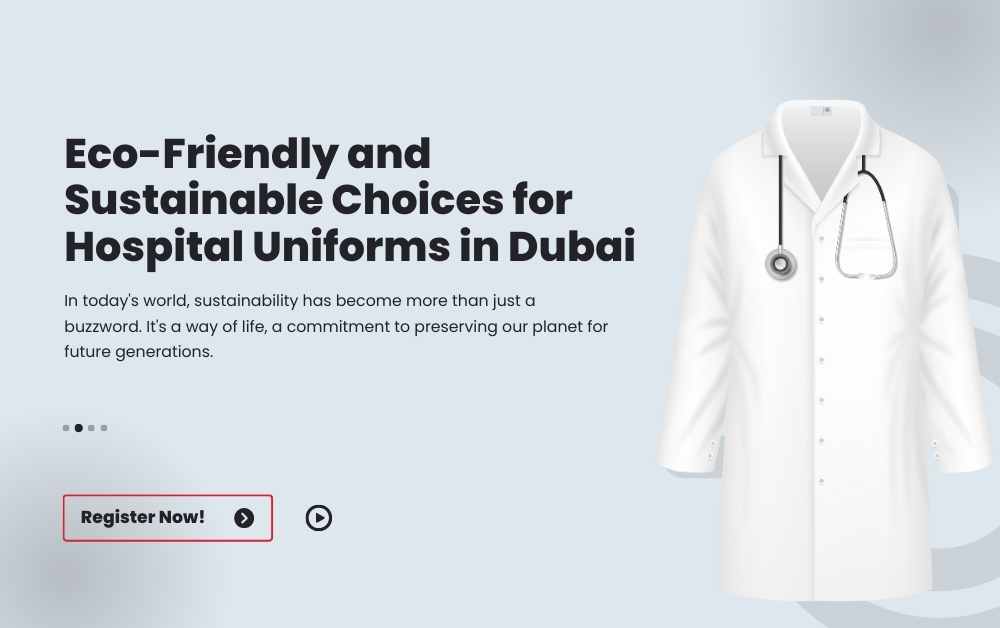In today’s world, sustainability has become more than just a buzzword. It’s a way of life, a commitment to preserving our planet for future generations. One industry that is gradually recognizing the importance of sustainability is healthcare. Hospitals in Dubai, like many around the world, are beginning to make eco-friendly and sustainable choices regarding their uniforms. In this blog post, we’ll explore the significance of eco-friendly hospital uniforms and how they contribute to a greener, healthier future for Dubai and beyond.
Why Eco-Friendly Hospital Uniforms Matter
1. Reducing Environmental Impact
Traditional hospital uniforms Dubai are often made from materials that are harmful to the environment. Polyester and other synthetic fabrics are derived from fossil fuels and require vast amounts of energy to produce. They also release microplastics into the environment when washed. In contrast, eco-friendly hospital uniforms are made from sustainable materials like organic cotton, bamboo, or recycled polyester. These materials have a significantly lower environmental footprint and help reduce pollution and resource depletion.
2. Promoting Health and Safety
Eco-friendly hospital uniforms are typically free from harmful chemicals and toxins, making them safer for both healthcare professionals and patients. Conventional uniforms often contain chemicals used in the dyeing and finishing processes that can cause skin irritations and allergies. By choosing eco-friendly options, hospitals prioritize the health and well-being of their staff and patients.
3. Conserving Water and Energy
The production of traditional textiles consumes vast amounts of water and energy. Eco-friendly materials like organic cotton and bamboo are grown using sustainable farming practices that require less water and energy. Additionally, many eco-friendly uniform manufacturers use eco-conscious production methods that reduce water and energy consumption even further. By opting for eco-friendly uniforms, hospitals in Dubai can contribute to water and energy conservation efforts.
Sustainable Materials for Hospital Uniforms
1. Organic Cotton
Organic cotton is grown without the use of synthetic pesticides or genetically modified seeds. It relies on natural farming practices that promote soil health and reduce water consumption. Organic cotton is soft, breathable, and comfortable, making it an excellent choice for hospital uniforms. It also biodegrades more easily than synthetic materials, reducing long-term environmental impact.
2. Bamboo
Bamboo is a rapidly renewable resource that grows quickly and requires minimal water and pesticides. Bamboo fabrics are naturally antibacterial, hypoallergenic, and moisture-wicking, making them ideal for healthcare settings. Bamboo-based uniforms are not only eco-friendly but also offer comfort and functionality.
3. Recycled Polyester
Recycled polyester is made from post-consumer plastic bottles. By choosing uniforms made from recycled polyester, hospitals can help divert plastic waste from landfills and oceans. This sustainable material is durable and easy to care for, making it a practical choice for medical professionals.
Eco-Friendly Uniform Features
When selecting eco-friendly uniforms for healthcare professionals in Dubai, consider the following features:
1. Biodegradability
Choose uniforms made from materials that break down naturally over time. This reduces the environmental impact of disposal.
2. Certifications
Look for certifications like Global Organic Textile Standard (GOTS) or OEKO-TEX Standard 100, which ensure that the uniforms meet specific environmental and safety criteria.
3. Dyeing and Printing
Opt for uniforms that use low-impact dyes and printing processes that minimize water and chemical usage.
4. Ethical Manufacturing
Select uniforms from companies that adhere to ethical labor practices and fair wages for workers.
Benefits of Eco-Friendly Hospital Uniforms
1. Positive Image
Hospitals in Dubai that prioritize sustainability and eco-friendly practices can enhance their reputation in the community. Patients and staff are more likely to support an institution that cares about the environment.
2. Cost Savings
While eco-friendly uniforms may have a slightly higher upfront cost, they often prove to be more cost-effective in the long run. They are durable and require less frequent replacement, saving hospitals money over time.
3. Employee Satisfaction
Healthcare professionals working in comfortable, eco-friendly uniforms are likely to be more satisfied and motivated. Happy employees provide better patient care.
4. Regulatory Compliance
As environmental regulations become more stringent, adopting eco-friendly practices and uniforms can help hospitals stay compliant and avoid potential fines or penalties.
Related Read – Cost-Effective Solutions for Hospital Uniforms in Dubai Where to Find Best Deals
How Hospitals in Dubai Can Implement Eco-Friendly Uniforms
Hospitals in Dubai can implement eco-friendly uniforms by first assessing their current uniform choices to identify areas for improvement. They should then seek out sustainable suppliers and manufacturers who specialize in eco-friendly hospital attire, ensuring they meet the necessary certifications and standards. Engaging healthcare staff in the decision-making process is crucial to selecting uniforms that are both eco-friendly and comfortable. Providing education and training on the importance of eco-friendly uniforms and their proper care is essential. Hospitals should also develop a plan for the responsible disposal of old uniforms, such as recycling or donating them. Regularly reviewing and updating uniform choices and sustainability practices ensures ongoing alignment with eco-friendly innovations.
- Assess Current Uniforms: Hospitals should begin by evaluating their existing uniforms and identifying areas where sustainability can be improved.
- Choose Sustainable Suppliers: Partner with suppliers and manufacturers that specialize in eco-friendly hospital uniforms. Ensure they meet the necessary certifications and standards.
- Employee Involvement: Engage healthcare staff in the decision-making process. Their input can help in selecting uniforms that are not only eco-friendly but also functional and comfortable.
- Education and Training: Provide training to staff on the importance of eco-friendly uniforms and how to care for them to maximize their lifespan.
- Recycling and Disposal: Develop a plan for the responsible disposal of old uniforms, such as recycling or donating them to charitable organizations.
- Continuous Improvement: Regularly review and update uniform choices and sustainability practices to stay aligned with the latest eco-friendly innovations.
Conclusion
Eco-friendly and sustainable hospital uniforms are more than just a fashion statement; they are a step towards a greener and healthier future for Dubai’s healthcare industry. By choosing materials like organic cotton, bamboo, and recycled polyester, hospitals can reduce their environmental impact, promote health and safety, and contribute to water and energy conservation efforts. The benefits of eco-friendly uniforms extend to positive branding, cost savings, employee satisfaction, and regulatory compliance.
As the world continues to prioritize sustainability, hospitals in Dubai have an opportunity to lead by example and make eco-friendly choices that benefit both the environment and the well-being of their staff and patients. It’s time for healthcare in Dubai to embrace eco-friendly uniforms and take a significant step towards a more sustainable future.
Read next blog – Audit Firm vs. Accounting Firm: Which One Do You Need?




